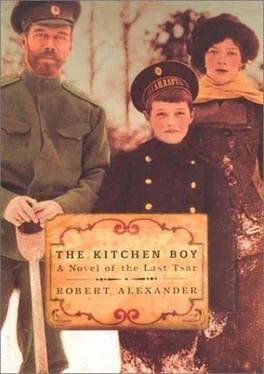Suddenly a voice behind me boomed, “Well, Leonka, so the fire’s lit and the water is heating? Ochen xoroshow .” Very good.
It was cook Kharitonov, all groggy and yawning, his shirt a mess, his oily hair sticking up. He hadn’t shaved in almost a week, but then I hadn’t had a bath in almost a month. Komendant Avdeyev didn’t allow us to make that much hot water, although Nikolai Aleksandrovich had been granted a bath of nine liters just the day before.
I thought I should tell him, but I remained quiet, for even then I understood the importance of the note.
And so I lied, “Yevgeny Sergeevich has asked for a glass of water.”
I was referring to Dr. Botkin of course. Dr. Yevgeny Sergeevich Botkin, the Tsar’s personal physician, who had voluntarily followed the family into exile and imprisonment.
Kharitonov puffed out his lower lip. “So do as the good doctor requests, lad, and take him his glass of water.”
The drinking water was in a large crock covered with a cloth, and I took a dipper and ladled water into a thin glass with a chipped rim. Saying nothing more, I headed out, clutching the glass in both hands because I was shaking so. As I skirted the dining room, I saw one of the Bolsheviki leading the Tsar’s second daughter, Tatyana Nikolaevna, to the water closet on the far side of the house, because that was the way it was, none of the Romanovs could use the facilities without being escorted by an armed guard. Tatyana Nikolaevna, so thin, so pretty, her light brown hair put up, glanced briefly at me, smiled slightly, and hurried on as a guard with a rifle and hand grenade followed immediately after her. She had turned twenty-one just the previous month.
Walking so very carefully lest I spill a drop, I passed from the dining room into the drawing room, where the manservant, Trupp, was putting away his bed things. I proceeded quickly past him to the alcove at the far end, where Dr. Botkin slept on a cot next to a wooden desk. When I walked in, the doctor was standing next to a large potted palm and fastening his suspenders.
I was almost too afraid to speak, but in case there were any guards nearby, I forced myself to loudly say, “I brought the water you requested, Yevgeny Sergeevich.”
He was a tall man, a big fellow with a goatee, small gold specs, and little eyes, whose granddaughter, by the way, still lives in Virginia. Well, this Dr. Botkin just stared at me, surprised at my impudence. Without hesitation, I went up to the wooden desk and set down the glass of water, managing of course to spill a bit in the process. As I frantically mopped aside the water with my hand, I glanced about the drawing room. There were no soldiers, so I jabbed my hand in my pocket, pulled out the small folded piece of paper, and dropped it on the desk next to the glass.
“This was hidden in the milk stopper,” I whispered, my voice trembling.
Studying me, he screwed up his eyes and then quickly snatched the note from the desktop. I know he wanted to ask me what in the devil’s name I was talking about, but only his eyes dared question. I turned and scurried out, just like that, and returned to the kitchen where cook Kharitonov was preparing the tiny pot of concentrated tea and slicing black bread, yesterday’s of course, which was no longer so moist but still nice and sour.
Despite my worries, I was exactly right in what I did, in how I handled the note. Going that early into Nikolai Aleksandrovich’s bedchamber might have attracted attention. However, directly approaching Yevgeny Sergeevich did not. And I trusted the doctor would know exactly how to handle the situation, for he was not only the Tsar’s personal physician, not only his close adviser, but at this point in their captivity also his dear friend.
I didn’t know then if Dr. Botkin could read the letter since it was written in a foreigner’s tongue, but he immediately passed it on to the Tsar and his wife. Aleksandra Fyodorovna, a woman of tightly strung nerves, never slept well, and hence was always loath to rise in the morning, particularly by eight-fifteen for the morning inspections. Such were the rules, however, and in the twenty or thirty minutes that passed between the time I gave Dr. Botkin the note and when the komendant viewed the household, Dr. Botkin must have entered the Tsar’s personal room. The Emperor and Empress shared the corner room with their ailing son, the Heir. And Dr. Botkin must have gone there under the pretext of checking Aleksei or perhaps the Empress herself – she had a bad heart, not to mention bad legs – and then slipped them the piece of paper.
By the time we were gathered for inspection it was obvious the Romanovs had read the note. Ever since the Heir’s lackey, Nagorny, had been hauled off to prison, we had been using the Empress’s rolling chaise, a large wicker device on wheels, to carry the Heir, for Aleksei was still recovering from a recent bleeding episode. And as I pushed Aleksei into the dining room and around the end of the table, I burned red with embarrassment akin to fear as the Tsar and Tsaritsa stared upon me, Leonka, the kitchen boy. Had I done wrong? Was I in trouble?
Even though Aleksei Nikolaevich was ill, even though he had lost so much weight, everyone kept saying he was growing as fast as a mushroom after a spring rain, and it was true. Tsar Nikolai, who took after his diminutive mother, was the exception in the family, for he was no taller than five feet six or seven inches. On the other hand, the Heir Aleksei, had he not been murdered, would have been a real Romanov, tall as a tree and big as a bear. And that summer the two of us were nearly the same height. He had dark hair, bright, sharp eyes that seemed to drink in everything, and as usual he wore a white bed shirt and his legs were covered with a blanket. That day, though, he told me he’d slept poorly – truly, this handsome lad was as pale as the moon, his skin almost translucent – because hours ago he had been woken by Red troops marching past the house.
“The Whites are on the way!” he whispered with excitement as I positioned him next to his mother.
So there we all were, gathered in the dining room, the seven Romanovs, Botkin, maid Demidova, cook Kharitonov, valet Trupp, and me. Lining up behind the heavy oak table, we automatically assumed our positions, first the Tsar, the Tsaritsa, the Heir Tsarevich, the four daughters from oldest to youngest, and then the five of us, from Dr. Botkin down to me, the last. That was the way it always had been at court before the revolution and still was in this house, everyone perfectly aware of their rank and automatically assuming their preordained position. And what a handsome family they were. As always Nikolai wore a khaki field shirt with the epaulets ripped off – cut away by order of the Bolsheviki – khaki pants of coarse cotton, worn brown leather boots, and of course that cross of Saint George on his chest. Sure, he was short, sure his nose was a bit stubby and his neck not too long, but he was trim, his arms surprisingly strong, his beard so beautiful, his eyes so sweet, his voice deep and rich. And Aleksandra? She was quite tall, quite imposing and regal, and that morning she wore little jeweled ornamentation and the same loose, dark blue cotton dress she had been wearing for many days. Though she was by then painfully thin, in her youth she had been a true beauty, her hair light, her complexion pure and white. It was no wonder their girls were so beautiful, their son such a treasure.
Waiting for the Bolshevik leader, all of us stood silent except Anastasiya Nikolaevna, the youngest daughter. In her arms she held her little black and tan dog, Jimmy, the tiniest of King Charles spaniels, and the young Grand Duchess kept saying little bits of nothing into the creature’s ears as she rocked him back and forth.
Читать дальше












